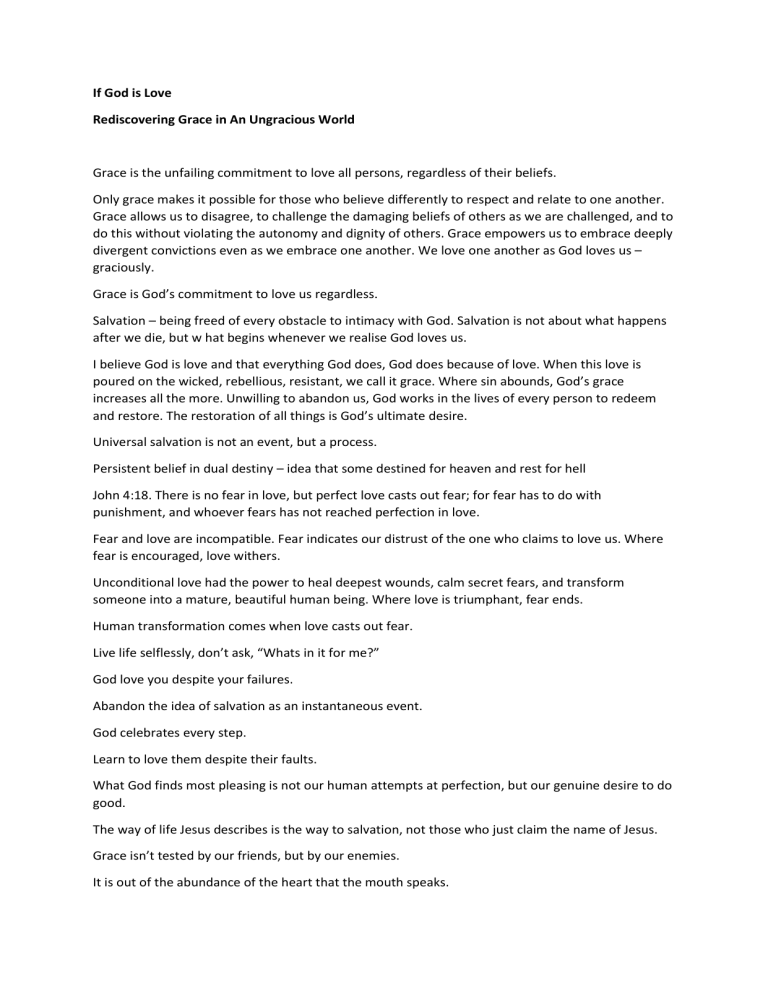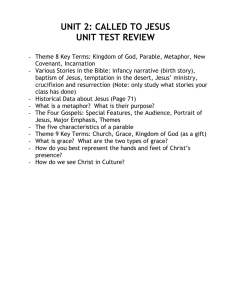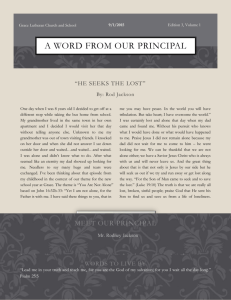
If God is Love Rediscovering Grace in An Ungracious World Grace is the unfailing commitment to love all persons, regardless of their beliefs. Only grace makes it possible for those who believe differently to respect and relate to one another. Grace allows us to disagree, to challenge the damaging beliefs of others as we are challenged, and to do this without violating the autonomy and dignity of others. Grace empowers us to embrace deeply divergent convictions even as we embrace one another. We love one another as God loves us – graciously. Grace is God’s commitment to love us regardless. Salvation – being freed of every obstacle to intimacy with God. Salvation is not about what happens after we die, but w hat begins whenever we realise God loves us. I believe God is love and that everything God does, God does because of love. When this love is poured on the wicked, rebellious, resistant, we call it grace. Where sin abounds, God’s grace increases all the more. Unwilling to abandon us, God works in the lives of every person to redeem and restore. The restoration of all things is God’s ultimate desire. Universal salvation is not an event, but a process. Persistent belief in dual destiny – idea that some destined for heaven and rest for hell John 4:18. There is no fear in love, but perfect love casts out fear; for fear has to do with punishment, and whoever fears has not reached perfection in love. Fear and love are incompatible. Fear indicates our distrust of the one who claims to love us. Where fear is encouraged, love withers. Unconditional love had the power to heal deepest wounds, calm secret fears, and transform someone into a mature, beautiful human being. Where love is triumphant, fear ends. Human transformation comes when love casts out fear. Live life selflessly, don’t ask, “Whats in it for me?” God love you despite your failures. Abandon the idea of salvation as an instantaneous event. God celebrates every step. Learn to love them despite their faults. What God finds most pleasing is not our human attempts at perfection, but our genuine desire to do good. The way of life Jesus describes is the way to salvation, not those who just claim the name of Jesus. Grace isn’t tested by our friends, but by our enemies. It is out of the abundance of the heart that the mouth speaks. Willingness of Christians to graciously absorb injury and abuse rather than respond in kind The bible become a weapon, a sword to wield against our enemies. Religion is how we decide who to love and who to hate We agree that God hates, we just disagree about who he hates. Anticipate their transformation. Instead of hating them, learn to love them. We treat all as children of God. They are our brothers and sisters. We show great respect for them. Kinship was the byproduct of a commitment to the will of God – to love and care for all. We love because he first loved us. Those who say ‘ I love God,’ and hate their brothers and sisters , are liars, for those who do not love a brother or sister whom they have seen, cannot love God whom they have not seen. John 4:19-20 Ethic of Jesus – a theology of inclusion, acceptance and love The one who showed him mercy – neighbour The demand for justice trump our obligation to love and narrow our neighbourhood. God loves our enemies as much as God loves us. And we are all created in the image of this God. Francis of Assisi – Whoever may come to us, whether a friend or foe, a thief or a robber, let him be kindly received. Should there be a brother anywhere in the world who has sinned, no matter how great his fault, let him not go away after he has once seen thy face, without showing mercy toward him. Remember that within each of us, given different circumstances, resides the potential for both great evil and great good. Pain, fear and pride are enemies of grace. See people as a person struggling to love and be loved and not knowing how. Only by befriending neighbours, strangers, and enemies do we begin to understand and love them. Many of us find it easy to judge and hate because we’ve not made the effort to know and understand. Empathy isn’t about knowing all the sordid details of another’s life. It is about remembering our own faults and failures and realizing others have theirs. It means rejoicing with those who rejoice and mourning with those who mourn, even when what they mourn is their own inability and weakness. Remind me again. Every momentous event, whether welcomed or resisted, has the power to unsettle us, to alter our lives in ways we’d never choose or desire. God was in heaven. Jesus came to earth. When he ascended into heaven, he left us the Holy Spirit. There will always be marriages worse than ours. I was hoping for something better. Learn to love unselfishly. Thomas Merton, “A selfish love seldom respects the rights of the beloved to be an autonomous person. Far from respecting the true being of another and granting his personality room to grow and expand in its own original way, this love seeks to keep him in subjection to ourselves. It insists that he conform himself to us, and it works in every possible way to make him do so. Give up quest for control. Give them room to grow, to be different. God was patiently and graciously working in the lives of all people to draw them toward wholeness. Create the space for her to question, explore and become the person God intends her to be – a person who, thank God, is quite different from me. Encourage and challenge, but try not to manipulate or compel. See difference as a gift, not a threat. God loved her more than I did. I don’t think God cares about who you love as long as you love somebody. What shall it profit a man if he shall gain the whole world, and lose his own soul? (mark 8:36, KJV) When salvation is defined so narrowly, it too easily becomes a status rather than a process. 4 spiritual laws, sinners, repented, accepted Jesus, received non-refundable reservation If you were to die tonight, where would you spend eternity? If you live tomorrow, what kind of life will it be? Point of life is not to get saved or to save others. Purpose of life was to live graciously. Freed from personal anxiety about God’s acceptance and no longer obsessed with creating others in my own image. Focus on what it means to be rather than do. I’m not so worried about what you do with your life. My concern is the kind of person you’ll be. Puspose of life isn’t to create more Christians, but “to let our lights shine before others, so they will see our good works and give glory to our Father in heaven. (Matthew 5:16) To be full of the Spirit is to have your heart broken by the things that break the heart of God. To be miserable is to exchange the joy of healing the brokenhearted, whether as a doctor, lawyer etc, for baubles and beads. We ought not to be weary of doing little things for the love of God, who regards not the greatness of the work, but the love with which it is performed. Goodness is rooted in the commitment to love others. Those who love are good; those who are good, love. Goodness is never about controlling others, but about loving them. The point isn’t obeying the rules (an act of the will), but in producing good fruit (an overflow of the heart). Our hearts are changed only when we realise God’s unconditional love for us and embrace our responsibility to love others unconditionally. We don’t need to accept Jesus into our hearts; we need to have the same heart as Jesus. Gently persistent – waiting patiently for her response and loving her too much to violate her autonomy Gracious religion is gentle, making room for a person to mature, knowing this takes time and often comes with pain and struggle. It is not impatient or instrusive. It respects the integrity of the other person too much to coerce or manipulate. Gracious religion is convinced that in the end every person will recognise the truth – that we are loved and created to love. We shall all know this truth, and this truth shall set us free. When by word or action we resists this truth, God waits patiently. When we finally end out rebellion, God’s joy is full. Belief is a gift of God. Beliefs that transform our lives resonate within us. The kingdom of God is within you. What it means to love others as God loves them, is to be willing to patiently and gently await that day, in this life or the next, when grace is triumphant. Until that day, gracious religion must help people feel better- more fully loved, more fully human – when they leave than when they arrived. We embrace them not just when their faith is strong, but especially when it isn’t. Evangelism- spreading good news. Don’t tell others the bad news- we’re saved and youre not. He lives within my heart. All truth is God’s truth. Truth keepers rather than truth seekers – quick to speak and slow to listen We are most like God when we love each other. Characteristics of gracious religion – gentleness, humility, openness and compassion Live graciously as Jesus, follow Jesus It is the way of Jesus, and not Jesus as the way. Imitate God and participate in God’s work in the world. You shall love your neighbour as yourserlf. Love your enemies and pray for those who persecute you. Do to others as you would have them do to you. I am with you always, to the end of the age. Gracious lifestyle – What would Jesus do? Prior to making decision or taking action Either they will find the courage to become different, or we will discover our judgements were wrong. Celebrate their worth. Its not called to greater power, but to more intentional and specific service. Love God with heart, soul, strength, and mind. Ask, seek, knock. Cross is the symbol of Jesus’s willingness to absorb pain, to share the most brutal of human conditions, and to demonstrate grace and forgiveness to the bitter end. Principle of Jesus – to love neighbour and enemy, to seek justice and equality, to live graciously in an ungracious world. Desire to control and manipulate rather than learn and grow. Do to others what we would have them do to us. Retributive justice. Our responsibility is not to change him, but to understand him. You cannot serve God and wealth.







